This Dot Blog
This Dot provides teams with technical leaders who bring deep knowledge of the web platform. We help teams set new standards, and deliver results predictably.
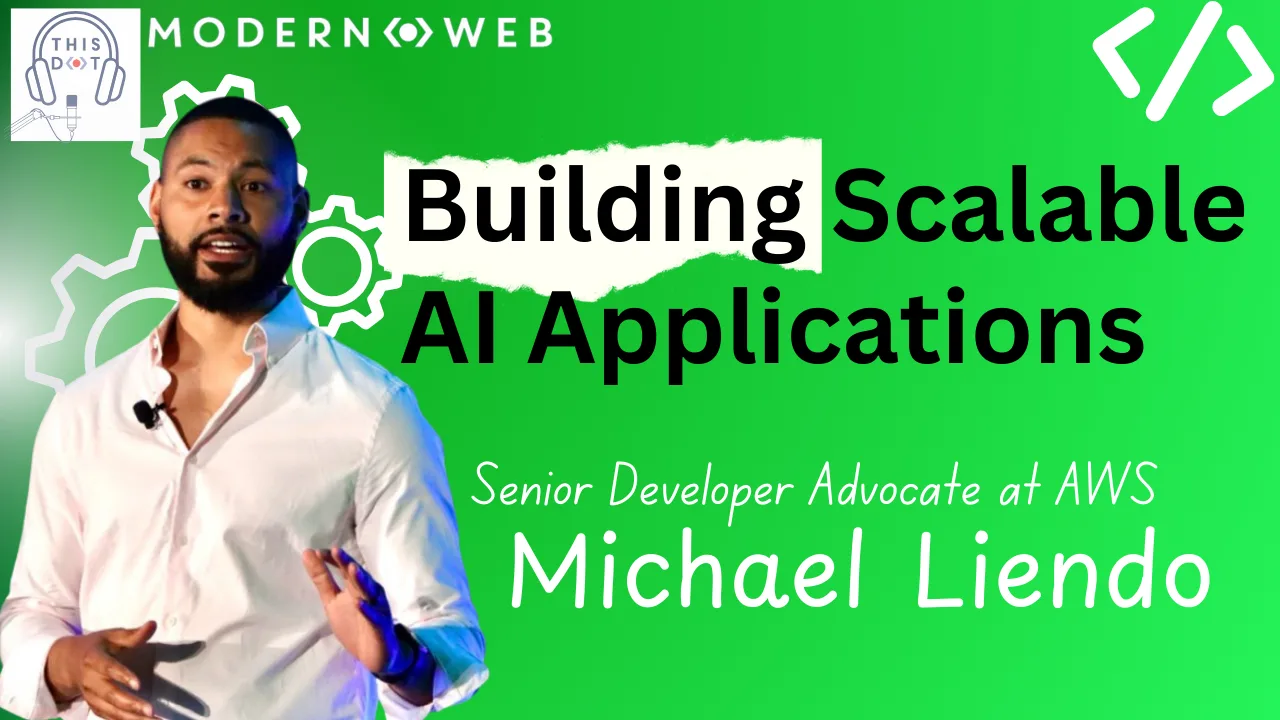
Building Scalable AI Applications: Insights from AWS's Michael Liendo
In this episode of the Modern Web Podcast, Rob Ocel, Danny Thompson, and Adam Rackis talk with Michael Liendo, Senior Developer Advocate at AWS, about building practical AI applications and tackling challenges like scalability, multimodal functionality, and cloud infrastructure choices. Michael shares insights on tools like AWS Amplify and DynamoDB, discusses strategies for managing cloud costs, and explores the evolving role of prompt engineering. Michael previews his upcoming talks at AWS re:Invent on AI and scalable B2B SaaS applications. Chapters 00:00 - Introduction and Guest Welcome 01:30 - Talking Weather and Life in the Midwest 03:00 - Exploring Generative AI and Practical Applications 06:45 - Navigating Cloud Costs and Scalability Considerations 08:30 - Maintaining Creativity and Customization with AI 11:00 - Managed Services vs. On-Prem Infrastructure Debate 15:30 - Choosing a Tech Stack for Side Projects and Startups 18:45 - Learning Cloud: Paths for Full-Stack Cloud Development 22:30 - The Role of Cloud Certifications in Today's Market 26:00 - Preview of Michael’s Upcoming Talks at AWS re:Invent 32:00 - Where to Find Michael Online Follow Michael Liendo on Social Media Twitter: https://x.com/focusotter Linkedin: https://www.linkedin.com/in/focusotter/ Sponsored by Wix Studio...
Oct 14, 2024
1 min
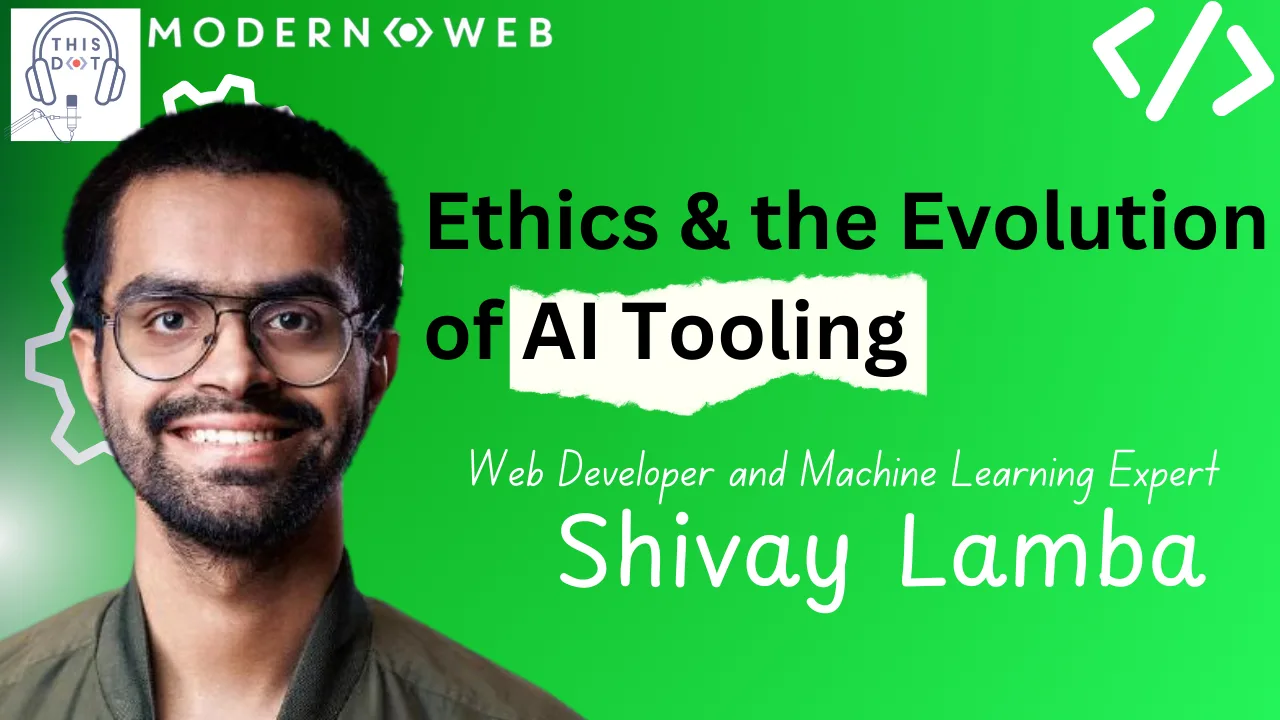
The Evolution of AI Tooling & Ethical AI Practices with Shivay Lamba
Machine Learning and AI expert Shivay Lamba, discusses the evolution of machine learning tools, and his work on MLOps and deploying large language models (LLMs). The conversation covers the accessibility of AI, the power of JavaScript in machine learning through tools like TensorFlow.js, and the growing importance of ethical AI practices. Shivay also discusses the transition of web-based AI tools, the importance of transfer learning, and how developers can break into the space of AI and machine learning. Chapters 1. Shivay’s Journey into Machine Learning (00:00 - 03:30) 2. The Power of TensorFlow.js and Web AI (03:31 - 07:00) 3. Challenges in Hackathons: Using Pre-trained Models (07:01 - 10:00) 4. Navigating the AI Ecosystem: Python vs. JavaScript (10:01 - 13:30) 5. LLMs and Their Growing Popularity (13:31 - 17:00) 6. The Importance of Core Machine Learning Knowledge (17:01 - 20:00) 7. AI Ethics & Challenges in Scaling Models (20:01 - 23:00) 8. Shivay’s Content & Community Involvement (23:01 - 25:00) 9. Conclusion & Final Thoughts (25:01 - End) Follow Shivay on Social Media Twitter: https://x.com/HowDevelop Github: https://github.com/shivaylamba Sponsored by This Dot: thisdot.co...
Oct 1, 2024
1 min
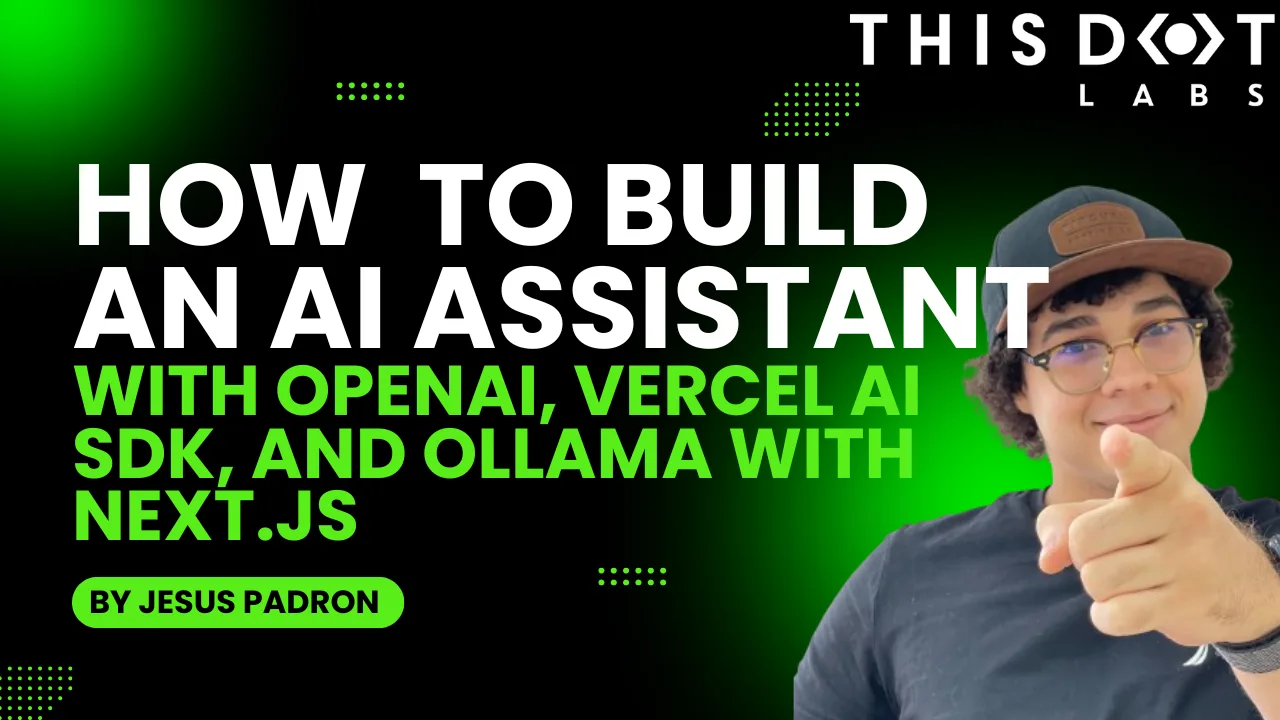
How to build an AI assistant with OpenAI, Vercel AI SDK, and Ollama with Next.js
Learn how to run Llama 3.1 locally in a Next.js app, send audio to it, and play responses back to users....
Sep 27, 2024
8 mins

Integrating AI Models Locally with Next.js ft. Jesus Padron
Jesus Padron from This Dot demonstrates how to integrate AI into a Next.js app with Meta's Llama 3.1, and OpenAI's Whisper and TTS models. By the end, you'll learn to build an AI voice assistant that processes and responds to voice input....
Sep 3, 2024
1 min
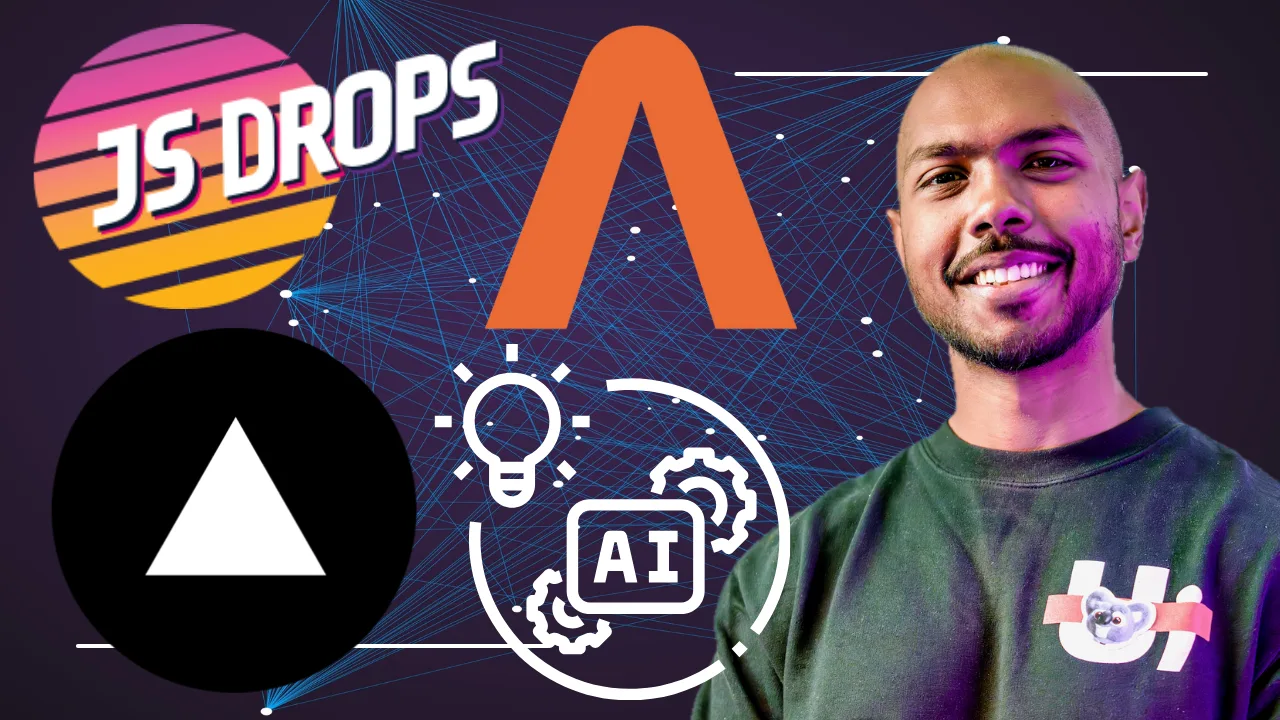
Gen UI, Astra DB, & Vercel’s AI SDK for User Friendly Apps: A Demo by Tejas Kumar
Join Tracy Lee and Mark Shenouda in this JS Drop episode as they discuss AI and GenUI with Tejas Kumar. Learn how to use DataStax Astra DB, Vercel AI SDK, and other cutting-edge tools to build smarter, more dynamic applications. This session covers everything from vector searches to generating interactive React components, offering practical tips and hands-on demos for developers. Chapters [00:00:00] Introduction to JS Drop [00:02:30] Tejas Kumar’s AI Presentation Overview [00:05:00] Demo: Traditional Keyword Search vs. AI Search [00:09:30] Building AI-Driven Search with DataStax Astra and Vercel AI SDK [00:16:00] Generating React Components with AI [00:24:30] Exploring Advanced AI Tools: WebSim and Beyond [00:32:00] Connecting DataStax Astra with AI Models [00:39:00] Best Practices for AI-Powered Development [00:45:00] Q&A and Final Thoughts Follow Tejas on Social Media Twitter: https://x.com/TejasKumar_ Linkedin: https://www.linkedin.com/in/tejasq/ Github: https://www.linkedin.com/in/tejasq/ ConTejas Podcast: https://www.youtube.com/playlist?list=PLEJpU2pV0Lie1VWU1unMg_7FRQ1gqFmAZ...
Aug 29, 2024
1 min
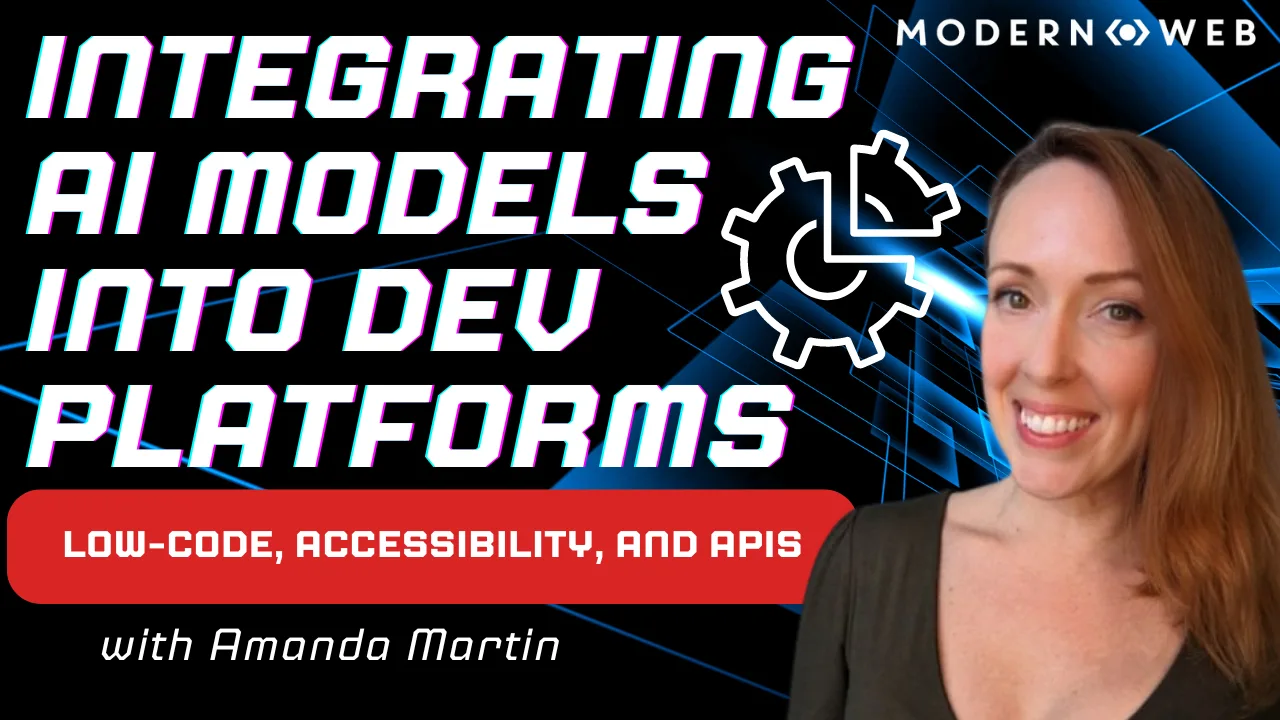
Integrating AI models into Dev Platforms (Low-Code, Accessibility, and APIs) with Amanda Martin from Wix
In this interview at RenderATL 2024, Tracy Lee and Rob Ocel interview Amanda Martin, a developer advocate at Wix, about integrating AI models into web development platforms. The conversation covers incorporating AI into low-code environments, emphasizing the accessibility of AI technologies through APIs and pre-built models. Amanda stresses the importance of understanding tools, security, and reliability, as well as practical applications and inspiring creativity in developers. The conversation touches on the accessibility of AI technologies in low-code environments. Amanda highlights the ease of incorporating AI through APIs and pre-built models, making it more accessible for developers of all skill levels. Understanding the available tools and services is crucial, with considerations for factors like security and reliability. By staying informed and up-to-date, developers can leverage AI to enhance their web development projects. Amanda stresses the importance of showcasing practical applications and inspiring creativity in developers. Rather than simply selling products, she believes in driving meaningful engagement with technology through hands-on experience and genuine passion. By encouraging developers to explore the possibilities of AI, Amanda believes they can unlock their full potential and create innovative solutions. Download this episode here....
Jul 11, 2024
1 min
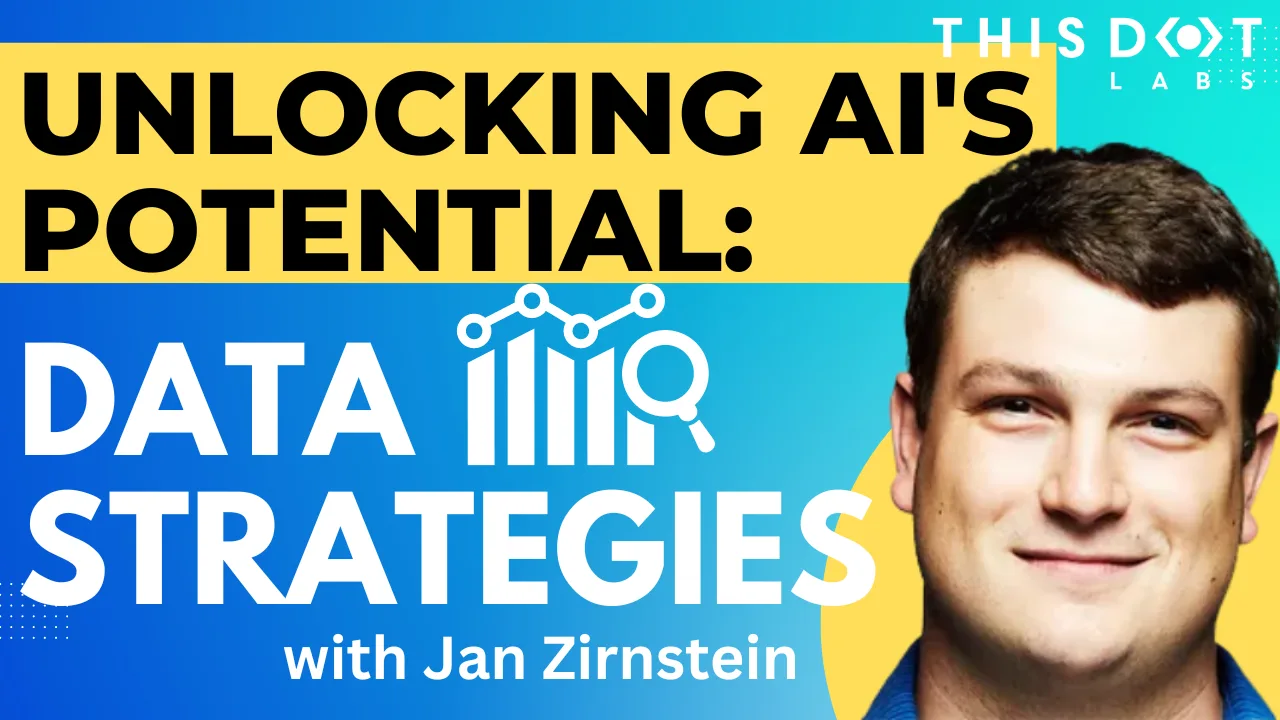
Unlocking AI's Potential: Data Strategies with Jan Zirnstein
Jan Zirnstein examines the intricacies of data science and AI, focusing on the challenges and opportunities that lie ahead. As organizations increasingly rely on data to drive decision-making, it's essential to establish clear guidelines and protocols for data management. Jan emphasizes that organizations must take ownership of their data, ensuring its accuracy, security, and ethical use. By implementing robust data governance practices, organizations can build trust, mitigate risks, and fully leverage AI technologies. Jan also stresses the need for education on AI technologies for leaders. As AI becomes more prevalent across industries, leaders must understand its capabilities, limitations, and potential biases. By fostering a culture of continuous learning and providing leaders with the necessary knowledge, organizations can make informed decisions and effectively use AI tools to drive innovation and growth. Education ensures that leaders are equipped to navigate the complexities of AI and make strategic choices that benefit their organizations. Along with Rob Ocel, he points out the importance of recognizing and correcting biases in training data, as these can perpetuate and amplify societal inequalities. By implementing rigorous data labeling processes and considering diverse perspectives, organizations can strive for fairness and inclusivity in their AI applications. Tackling bias is essential to creating AI systems that are equitable and credible. Lastly, Jan underscores the importance of continuous validation and ethical considerations in AI applications. As AI models evolve, it is crucial to regularly validate their performance and ensure they meet ethical standards. Transparency and accountability are key to building trust with users and stakeholders. By prioritizing ethics and embracing transparency, organizations can harness the full potential of AI technologies while minimizing potential risks. The conversations between Rob Ocel and Jan Zirnstein underscore the significance of data ownership, leader education, bias correction in data labeling, and ongoing validation, guiding organizations to navigate the evolving technology landscape and drive innovation, productivity, and societal progress. Download this episode here....
Jun 24, 2024
2 mins
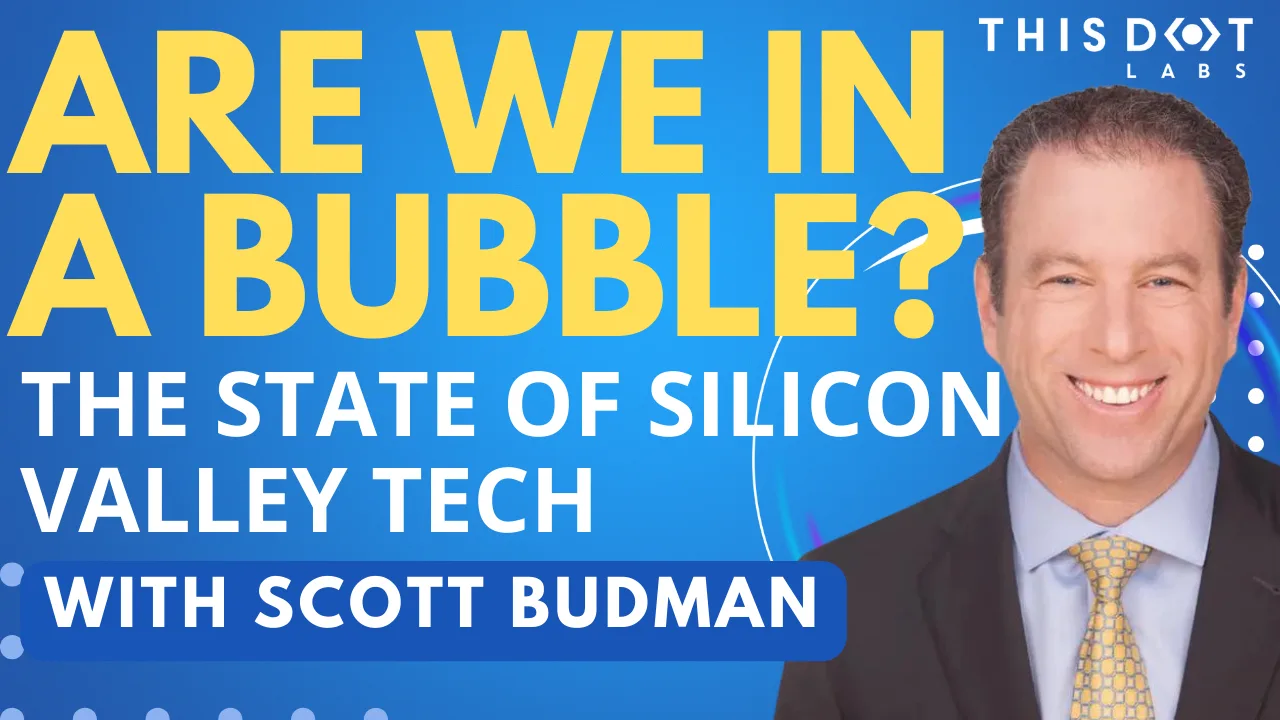
Are We in a Bubble? The State of Silicon Valley Tech with Scott Budman from NBC News
In this episode of the podcast, host Rob Ocel and co-host Tracy Lee are joined by Scott Budman, Emmy Award winning Business and Technology Reporter at NBC Silicon Valley, to talk about what’s happening in the world of Silicon Valley tech and entrepreneurship. Scott emphasizes the importance of historical context in understanding tech trends and highlights the cyclical nature of innovation, providing listeners with a deeper appreciation of how past developments shape current advancements. One of the key topics discussed is the impact of artificial intelligence (AI) on search technology. Scott explains how AI has revolutionized the way we search for information, making it more personalized and efficient. However, he also acknowledges the challenges that arise when innovation outpaces regulation, stressing the need for a balanced perspective on tech advancements. This segment underscores the complex interplay between rapid technological progress and the regulatory frameworks that struggle to keep pace. The conversation discusses the role of journalism in providing unbiased reporting. Scott emphasizes the significance of staying connected with the audience through social media engagement and discusses the evolving role of tech leaders. He highlights the unique ecosystem of Silicon Valley, where innovation thrives, and tech giants continuously push the boundaries of what is possible. This part of the discussion sheds light on the critical role journalists play in interpreting and disseminating information in a rapidly changing tech landscape. Lastly, Scott shares insights into what makes a CEO effective in the fast-paced tech industry, emphasizing the importance of adaptability, vision, and the ability to navigate through uncertainty. The episode concludes with a thought-provoking discussion on the dynamic nature of the tech industry and the potential implications of AI on society and business. It serves as a reminder of the importance of critical evaluation and staying informed about the latest tech trends, making it a valuable listen for both tech enthusiasts and those curious about the ever-evolving world of Silicon Valley. Download this episode here....
Jun 18, 2024
2 mins
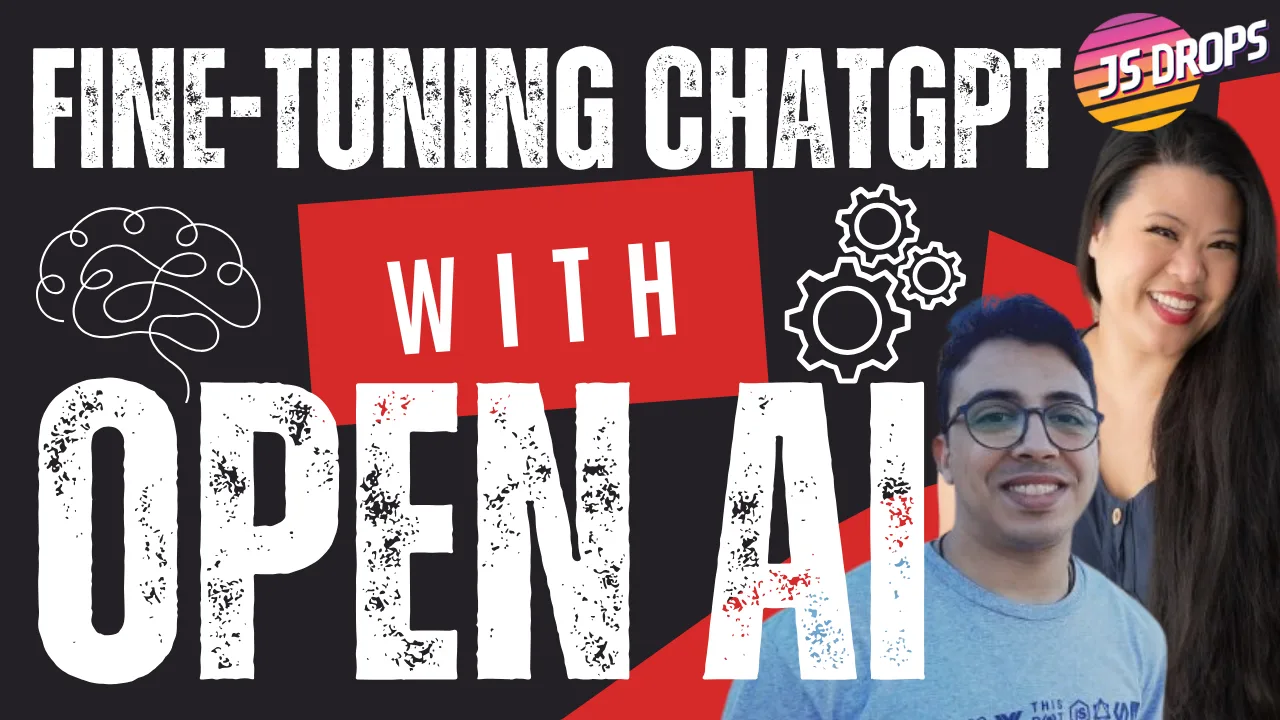
Fine-Tuning with OpenAI in a Real World App with Mark Shenouda
In this training, Mark Shenouda explores the OpenAI’s fine tuning feature. We’ll learn how to do implement fine tuning in a Next.js application. Fine-tuning involves providing specific examples and adjusting the model's behavior to improve its understanding and responses. By exposing the model to a wide range of data, it learns to generate more accurate and contextually appropriate answers. This process enables AI to grasp the intricacies of various tasks. This training illustrates the clear distinction between fine-tuning and RAG. RAG relies on retrieving pre-existing information, while fine-tuning takes a step further by training the model on specific data. This approach is highly effective for tasks requiring a deep understanding of particular domains or datasets. By fine-tuning AI models, developers can create products that not only understand their domain's nuances but also provide relevant and helpful responses, saving valuable time and resources. Despite its advantages, fine-tuning comes with challenges, notably the cost implications due to the extensive training data required. Fine-tuning demands a substantial amount of data to ensure the model's accuracy and effectiveness. Additionally, data preparation is crucial, involving organizing the data in a structured format, to facilitate seamless integration with the AI model. While fine-tuning enhances AI performance, RAG is also effective in certain scenarios. Evaluating the specific requirements of each task and determining the most suitable approach allows developers to optimize AI performance and achieve the desired outcomes. Watch this episode of YouTube....
Jun 18, 2024
1 min

Adding RAG to a Chatbot using AstraDB, Cohere, OpenAI, Vercel and Next
In this training led by Mark Shenouda, viewers learn how to integrate ChatGPT using technologies like Vercel, Next.js, and Tailwind CSS. This training covers generating code with AI, setting up OpenAI providers, and using AstraDB for data storage. This guide will show how these tools can create intelligent, efficient, and visually appealing applications that offer personalized user experiences. ChatGPT, developed by OpenAI, changes how we interact with AI models. With its advanced natural language processing capabilities, it offers many possibilities for developers and businesses. By integrating ChatGPT into projects, we can create intelligent chatbots, automate tasks, and provide personalized user experiences. The ability to generate human-like responses and understand context makes ChatGPT a powerful tool for enhancing customer engagement and operational efficiency. Next.js is a powerful React framework and makes ChatGPT integration easy by providing a strong foundation for building dynamic and interactive user interfaces. Its server-side rendering capabilities ensure fast and efficient content rendering, resulting in a smooth user experience. By combining the power of ChatGPT with Next.js, developers can create intelligent chat interfaces that respond to user queries in real time. Additionally, Tailwind CSS, a utility-first CSS framework, simplifies the process of styling and designing user interfaces. With its extensive set of pre-built components and utility classes, developers can quickly create visually appealing interfaces without the need for custom CSS. Vercel, a popular cloud platform for static sites and serverless functions, offers an easy integration experience for ChatGPT. With Vercel's simplicity and ease of use, setting up actions and deploying apps becomes straightforward. Vercel provides the infrastructure needed to bring your ideas to life. Its intuitive deployment process and scalability ensure that your applications run smoothly and can handle varying levels of traffic. AstraDB, a data storage solution, plays an important role in maximizing the potential of ChatGPT integration. By storing relevant data in AstraDB, developers can access and retrieve information efficiently, enabling the chatbot to provide accurate and contextually relevant responses. One of the key advantages of ChatGPT integration is the ability to customize the chatbot's behavior and responses. Developers can also use OpenAI’s fine-tuning to tune the model to align with their specific requirements, ensuring a personalized and tailored experience for users....
Jun 17, 2024
2 mins

Effortless App Building with V0.dev and Next.js Training featuring Mark Shenouda
In this JS Drop training, Mark Shenouda covers the capabilities of v0.dev by building a custom Next.js application. He explores the features and benefits of v0.dev, highlighting its efficiency in generating interfaces, customizing UI elements, and simplifying deployment processes. v0.dev allows users to build interfaces. The integration with Next.js is a game-changer, enabling the addition of new pages to projects with a single command. It efficiently generates different interface options, making it a valuable tool for both developers and non-developers. With v0.dev, interactive layouts can be achieved without extensive coding knowledge, opening up new possibilities for app development. One of the standout features of v0.dev is its ability to customize UI elements. The tool provides a range of options to tailor the user interface to specific requirements. Whether it's tweaking colors, fonts, or layouts, v0.dev empowers developers to create visually appealing and user-friendly interfaces. This flexibility ensures that the final product aligns with the desired aesthetic and enhances the overall user experience. v0.dev seamlessly integrates with Next.js, a server rendering framework for React. This integration brings numerous benefits, including simplified deployment processes and enhanced performance. Next.js allows for server-side rendering, resulting in faster page loads and improved SEO. With v0.dev, app development becomes more accessible and efficient, allowing for faster iterations and improved user experiences. Whether you're a seasoned developer or a non-technical individual looking to bring your app idea to life, v0.dev is definitely worth exploring....
Jun 11, 2024
2 mins
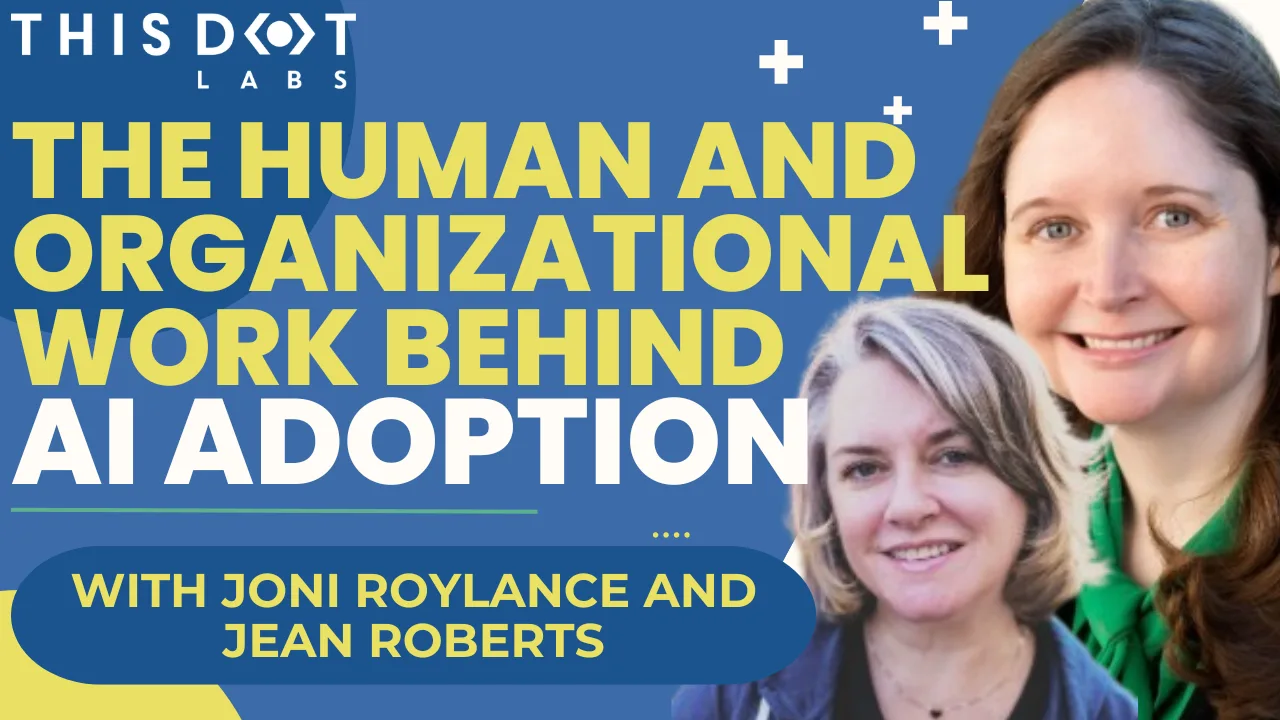
The Human and Organizational Work Behind AI Adoption with Joni Roylance and Jean Roberts
Rob Ocel and guests Joni Roylance and Jean Roberts discuss the complexities of implementing AI in organizations, highlighting the importance of a human-centered approach. They emphasize that to fully benefit from AI, organizations need to consider how the technology affects people and how to address their concerns. One key takeaway is the importance of building trust and aligning AI initiatives with organizational values. AI can be met with skepticism, especially if employees feel their jobs or privacy are at risk. To overcome this, organizations must prioritize transparency and open communication. Involving employees in the decision-making process and addressing their concerns helps foster trust and reduce resistance. Aligning AI with core values ensures it enhances rather than replaces human capabilities. The podcast also stresses the need for user-centric design. AI solutions should be developed with a deep understanding of users' needs and pain points. Poor user experience (UX) can lead to failed AI deployments if users struggle to understand or trust the technology. Organizations should invest in interdisciplinary collaboration, involving UX designers, data scientists, and domain experts to create intuitive and user-friendly AI systems. Prioritizing the human experience can lead to higher adoption rates and successful implementation. Transparency and engagement are crucial for building trust and acceptance of AI. Engaging employees and users in the AI process through activities like naming contests can foster ownership and involvement. Involving users early allows organizations to gather feedback, address concerns, and refine the technology. Transparent communication about AI goals, limitations, and impacts helps manage expectations and ensures a smoother transition. By building trust, aligning with values, and focusing on user experience, organizations can overcome resistance and ensure higher adoption rates. A human-centered approach not only leads to successful technological transformations but also empowers employees and enhances the overall user experience. Download this episode here....
Jun 3, 2024
2 mins
Let's innovate together!
We're ready to be your trusted technical partners in your digital innovation journey.
Whether it's modernization or custom software solutions, our team of experts can guide you through best practices and how to build scalable, performant software that lasts.